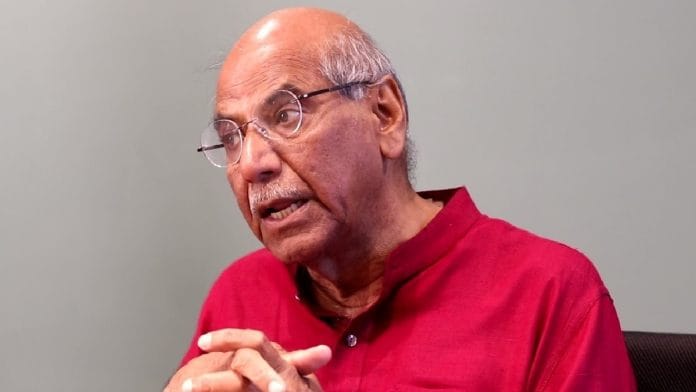Former foreign secretary Shyam Saran says despite the recognition Prime Minister Modi has received, there’s more that needs to be done.
New Delhi: Prime Minister Narendra Modi has been an active leader in terms of engagement with the rest of the world and is widely recognised as such, but a little more needs to be done for India to have a bigger role on the global stage, former foreign secretary Shyam Saran has said.
Saran was answering questions after chairing a panel discussion Tuesday on ‘The Emerging World Order and India’s Role’, the concluding session of a two-day event, ‘CPR Dialogues: India’s 21st Century Transitions’, organised by the Centre for Policy Research (CPR) in Delhi.
Saran’s observation came when an audience member asked a question about the lack of visionary world leaders in the current scenario, and remarked that Modi was one.
Talking about India’s foreign policy under Modi, Saran said engagement was one thing, but it was equally crucial to put forward one’s vision of the world in a way that others buy it too.
“It is not enough that I have a certain vision about India and India’s role,” he said. “You also need to be able to persuade others that, yes, this is a vision that they can also buy.”
‘Transactional diplomacy’
Saran rued that, in this respect and also because of certain circumstances, a lot of “Indian diplomacy today has become very transactional”.
“We look at where will I be able to take some benefit out of someone or where do we avoid some problem for ourselves by making certain adjustments…” he said.
“So, it is very much a foreign policy of here and now. Even though the rhetoric may be that we are looking at the long term, that’s not what we are doing in reality,” he added.
The panellists, including former Nigeria foreign minister Ibrahim Gambari and his Egyptian counterpart Nabil Fahmy, deliberated on several issues, including multilateralism, the need for closer global engagement and the lack of leadership.
Fahmy said there had to be an “intellectual engagement” among countries on what the new world order should be, adding that there had to be a balance of interest, rather than a balance of power, among countries.
Also read: Modi not quite sure how he should deal with Donald Trump: Ex-foreign secretary Shyam Saran
NAM on the agenda
Talking about the non-aligned movement (NAM) — a campaign started during the Cold War to discourage alignment with either of the two blocs (the US and the erstwhile USSR), with Egypt and India among the early pioneers — Saran said that, despite arguments otherwise, it had played a very important role at a time when the world was locked in a dangerous confrontation.
But in the present day, when the world is no longer bipolar and that kind of a conflict doesn’t exist, the countries forming part of the non-aligned movement needed to have a certain commitment, and see that they had an important role to play even in the new world, Saran said in reply to a question.
“Unless that perception comes back, unless there is a kind of a revival of that spirit and solidarity among the countries… That is where leadership comes in,” he added.
According to Saran, it was imperative to see whether the major non-aligned countries such as India, Nigeria and Egypt could provide that leadership, as one alone couldn’t do it.
“You need to have a catalyst, kind of a group, which is able to inspire other developing countries, come up with an agenda that everybody can buy,” he said, “Right now we don’t have an agenda.”
The dragon in the room
Saran said there were many similarities between India and China, but added that their differences could not be discounted.
“The way in which China looks at the world and sees its place in the world is very different from the way India looks at the world and sees its place in the world,” he said.
“There are areas where we can work together and there are areas where we need to confront each other,” he added.
Saran said it was an achievement that the border has remained peaceful over several years.
Meanwhile, answering a question about Boko Haram in Nigeria, the terrorist outfit known to have unleashed a wave of tyranny in west Africa, Gambari said that while the group’s military capability “has been decimated and they have been pushed away, the root cause of alienation, exclusion, hopelessness and unemployment of the poor needs to be tackled before it can actually be defeated”.
Also read: Shyam Saran’s book is an insight into the compulsions and motivations in our foreign policy
ThePrint is the digital partner for CPR Dialogues: Navigating India’s 21st Century Transitions, a dialogue on public policy challenges organised on 17 and 18 December in New Delhi.
This report was updated to phrase an audience query better.







An enlarged global role could be crafted once the second term starts.